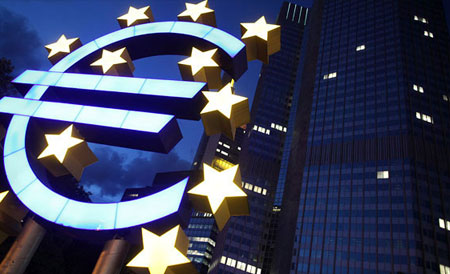S&P's downgrade, an interestingly timed bomb
 0 Comment(s)
0 Comment(s) Print
Print E-mail
Xinhua, January 15, 2012
E-mail
Xinhua, January 15, 2012
The Standard & Poor's downgrading of nine eurozone nations, on first impression, might sound like a heavy blow towards eurozone market sentiment. But analysts believe its follow-on effects may be limited.
|
|
|
Standard & Poor's downgraded nine European governments on Jan.13, 2012. |
Interesting timing
Someone called Friday as the "black Friday", which may sound exaggerated but well reflected what's going on in eurozone.
Three pieces of bearish news came out in one day. The other two are: Greek government debt swap negotiation may come to a collapse, and ECB's executive board member Jorg Asmussen criticized draft fiscal compact as too weak.
The timing of S&P's action is very interesting. Eurozone market sentiment is gradually recovering with the beginning of a new year. Euro's price falling against U.S. dollar seemed come to a halt, major stock markets indices remained stable and gradually recovered, key nations' government debt yields, like Italy and Spain, also witnessed some gradual falling.
What's more, Italy and Spain's government bond auction also received welcome from market, which hints degree of debt crisis may fade away.
But the news was like dropping a rock into a tranquil pond, which caused strong market reactions. The news, combined together, may reverse upward market tendencies gradually built over the days.
It also came out two weeks before the next EU summit due at the end of of January. It is a common practice the rating agencies may downgrade or threaten to downgrade eurozone nations before a summit.
Effects still unknown
S&P's decision was confirmed after close-up of European stock markets but it was grabbed by the media beforehand, which saw instant falls in major index.
Its effects is also illustrated in euro's price trends. Euro's value fell below 1.27 U.S. dollar swiftly following its confirmation. It seem short-term effects of the news is somewhat serious.
But analysts doubt its seriousness or scope.
"The downgrade of France and other Eurozone countries is likely to increase the EFSF's financing costs. However, the effects could be limited as the rating of key countries - especially Germany - remains stable with a positive outlook," Said Janis Emmanouilidis, senior policy researcher with European Policy Center, a famous European think-tank located in Brussels.
Some analysts also pointed out that the Standard & Poors' intention was well known days before the officially announced decision, during which markets saw successful auction of government debts of France, Spain and Italy, which means markets were well prepared for the downgrading.
But its effects may still be there, despite above-mentioned facts. "In more general terms, the downgrades undermine the crisis management efforts as they undermine the confidence-building process." said Janis Emmanouilidis.
What's more, it may turn out to be a sword with double edges. "The downgrade indicates that more needs to be done to manage and eventually overcome the crisis." Janis Emmanouilidis said. "The downgrade does not reflect the fact that the efforts of the Eurozone to escape the crisis had shown some promising positive results."







Go to Forum >>0 Comment(s)